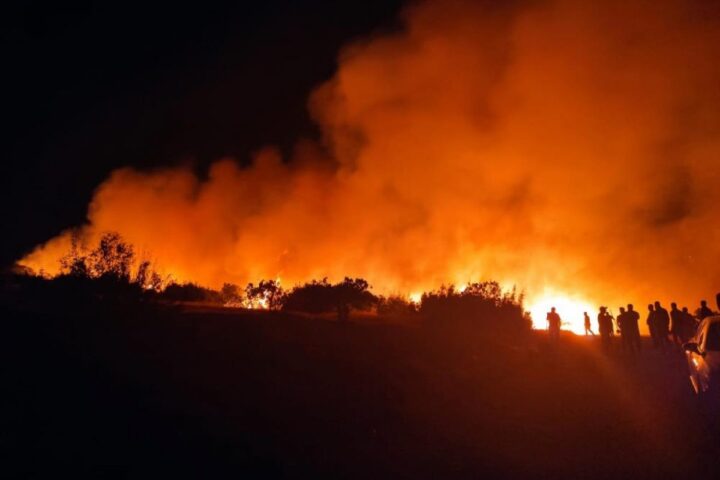The Climate Crisis is here…
Every fraction of a degree of global warming increases the intensity, frequency and impact of natural disasters and extreme weather events. With 1.1 degrees Celsius of warming since the pre-industrial period, it is clear that the climate crisis is here!
In just the last year, parts of the world were trying to survive droughts and wildfires while other areas of the globe were being devastated by floods. Most Affected People and Areas (MAPA) are suffering the most from these consequences and yet dirty banks continue to invest in the fossil fuel industry that fuels the climate crisis (see how you can take action with us to demand the climate killer, Standard Chartered Bank divest from fossil fuels: https://fridaysforfuture.org/cleanupstandardchartered/ ), businesses are engaging in more and more greenwashing and our governments are complacent in the face of this crisis! The system we live in profits from and then exacerbates the divide that worsens the toll these extreme weather events take on exploited communities. In this article, we outline some of the impacts the climate crisis is having today and how you can take action for people and the planet!
In late July 2021, there were floods and fires in Kurdistan. It destroyed houses and barns as well as killing many animals. In India, super cyclone Tauktae took at least 91 lives, damaged thousands of houses, boats and state infrastructure in Kerala, Karnataka, Goa, Maharashtra and Gujarat. Another cyclone that occurred in India was cyclone Yaas, which caused 20 fatalities and affected Assam, Meghalaya and Sikkim. Along with these, there were wildfires in Turkey, Italy and Greece. Turkey also witnessed some floods along with Central Europe.
Sign and donate to to help fight climate change
- Demand climate education in Bengal
- To World Leaders: The Time for Action on Climate Change is Now.
- Demand Congress support climate-displaced communities.
- Fundraiser to help the victims of cyclones Tauktae and Yaas (organized by Go Dharmic in partnership with FFF Digital).
Higher global average temperatures lead to more extreme weather events, such as heat waves. This is accompanied by drier conditions as moisture evaporates more quickly from soil and water bodies, leading to drought. Because the organic matter in forests is now drier as well, they catch fire and spread much more easily. At the same time, this increased evaporation falls as rain or snow, and can be caught up in storms too. Global temperature increase means that icecaps are melting, which causes sea level rise and therefore, flooding. Hurricanes, tornados, cyclones, typhoons and many other natural disasters are and will also continue to increase in intensity and frequency.
Natural disasters are not the same as weather events. According to the IPCC (Intergovernmental Panel on Climate Change), an extreme weather event is an event that is rare at a particular place and time of year. Disasters are defined as severe alterations in the normal functioning of a community or a society due to hazardous physical events interacting with vulnerable social conditions. A cyclone that occurs mainly at sea where no boats are sailing and therefore no people are involved or harmed is an extreme weather event but not a disaster. The aforementioned Cyclone Tauktae is undoubtedly a natural disaster due to the destruction of 16,000 homes and the death of 174 people. You can take digital action using this toolkit in demanding justice against the rising amount of cyclones in South Asia.
We are all impacted by the climate crisis – but not equally!
Due to the world’s history of colonization the Global South has continuously been exploited for imperialist countries’ profit.
In the case of cyclone Tauktae again (the tropical cyclone which affected areas in India, Maldives, Pakistan and Sri Lanka) a person with more money may have been able to drive their own private vehicle, or pay to fly away from the area, pay for medical care if they still get injured, stay in a hotel for a week, come back to their somewhat damaged home but that was already better built structurally and call their insurance company, to use Dr Ilan Kelman’s example. Eliminate all or most of these abilities and this will show how poorer people are being more impacted by extreme weather events and, therefore, the climate crisis; not because of this one individual but because of the system. Together we must put our foot down on the interconnected issues of racism, sexism, ableism, class inequality, the climate crisis and more than that, fight for a just future that leaves no one behind! Join us to on September 24th to #UprootTheSystem: https://fridaysforfuture.org/september24/
The latest IPCC report has confirmed that climate change is contributing to these extreme weather events but also that we can still limit our warming to 1.5C with rapid climate action. We need collective organising to achieve intersectional climate justice!

